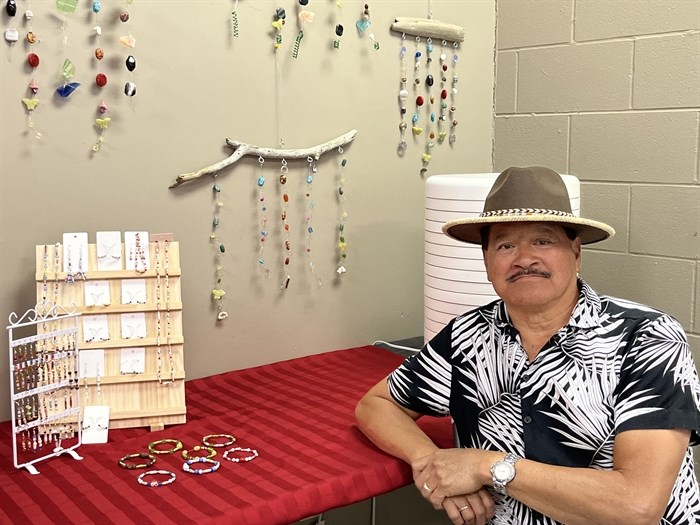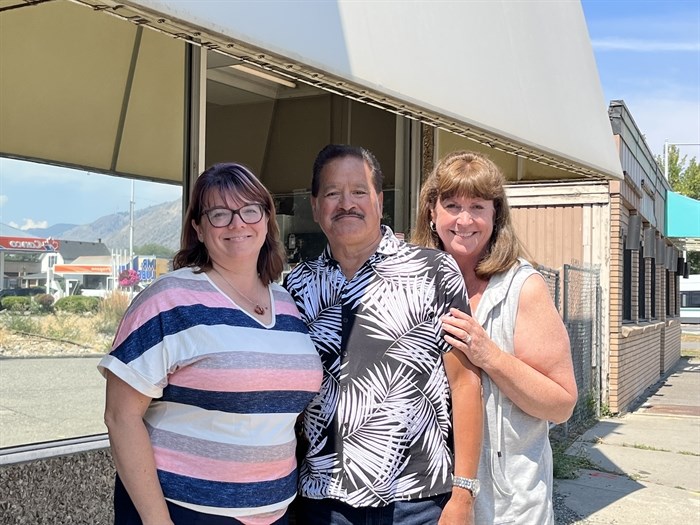
Herb Charlie is a Sixties Scoop survivor and member of the Sq’ewlets First Nation who lives in Kamloops, pictured here at the Kamloops Aboriginal Friendship Society.
(SHANNON AINSLIE / iNFOnews.ca)
August 04, 2025 - 6:00 AM
CONTENT ADVISORY
Kamloops Indigenous elder Herb Charlie was forcibly removed from his biological mother two days after he was born in Vancouver in 1955.
He was placed in an orphanage with hundreds of other babies for two-and-a-half years before being placed in the foster home of a white woman.
Charlie was one of more than 20,000 First Nation, Metis and Inuit children in Canada removed from their homes from the early 1950s to the early 1980s in a government program known as the Sixties Scoop, according to the Canadian Encyclopedia. Indigenous babies were placed with non-Indigenous families without the parent or band’s consent as part of an effort to assimilate them into white society.
According to a report Charlie recently obtained from the federal government, during his first two years of life he was over institutionalized resulting in delayed walking and speech.
In that same report, Charlie is described by professional social and care workers as an unattractive baby, a dirty little Indian, a retard and a moron.
“Back in the time when I was born it was an era where prejudice was very high against Indigenous people, the racism was worse back then,” he said.
The foster home Charlie was placed in was a subsidized toddler home for children awaiting committal to Woodlands, a mental hospital in New Westminster that shut down in the 1990s.
His foster mom, Mrs. Thereux, decided to keep him, while countless Indigenous children came and went.
“She saw something in me and kept me, so I was lucky,” he said. “I was always afraid of the social worker coming to the house. I always asked my mom how come they’re only here a short time and they go? My mom said they’re sick. They’d take (children) away so it made me scared and I’d run out the back door when workers came.”

From left to right: Jennifer Nickel, Herb Charlie, Dee-Anna Charlie.
(SHANNON AINSLIE / iNFOnews.ca)
As a teenager, Charlie’s closest two friends were also Indigenous. The friends started smoking hash, then huffing nail polish remover. Their addictions eventually turned into the use of LSD, then injecting drugs. Charlie left the friendships behind and at age 17, his foster mother got remarried and he headed into the world on his own after completing grade 11.
He went to Vancouver to track down his family history but was denied the information until he was in his early 20s, but by then it was too late meet his biological mother, as she had passed eight years prior.
“If the government would’ve told me back then when I was first asking, I would’ve been able to meet her,” he said.
Charlie learned he is from the Sq’ewlets First Nation near Harrison Hot Springs and was able to meet his aunt and uncle, cousins and grandparents living on reserve there.
“There was a sense of belonging meeting them,” he said. “When I was growing up, I didn’t know who I was. I didn’t grow up with cultural teachings but over the years they taught me about sweat houses and talked about cultural dancing.”
Six years ago, Charlie obtained records with more information about his upbringing as it was required for his Sixties Scoop settlement provided by the federal government as a part of the reconciliation effort. Much of the report is blacked out and there is racist, derogatory wording in it.
Recently, an Indigenous roots worker with Secwepemc Child & Family Services, Jennifer Nickel, was able to fill in the remaining gaps in Charlie's ancestry. She works to find the genetics and genealogy of Indigenous youth and elders.
“Doing this for elders is the most rewarding,” she said. “For many of them there is shame associated with not knowing their parentage and the way it was taken from them. There are many Indigenous elders who are disconnected from their families and not because of a failure of the family, it was a failure of the system.”
Nickel submitted Charlie’s DNA into a database and later discovered the man listed as his biological father in government records was not related to him.
“Herb’s DNA testing came back we discovered his biological father wasn't white, he was 100% Chinese, from a region in southern China," she said. "He’d likely come over in the early 1900s and worked in the area, probably on the railway. We don’t really know the person but we know the story.”
The DNA results arrived on BC Family Day.
“At the age of 69, to find out he is not white, but Chinese, to finally find out who he is and why he looks like he does, that was important and unforgettable,” Charlie's wife Dee-Anna Charlie said.
Nickel said technology is increasing making it easier to delve into genealogy and piece together family trees with what DNA results offer. She also uses her professional access to obtain records, along with newspapers and obituaries to pull family history together.
“For the people who grew up never knowing, finding out that information can be overwhelming but also incredibly healing. I’ve not dealt with a single person who hasn’t been brought to tears by it,” she said. “You can bring a 75-year-old woman to her knees in grief talking about what she went through when she was 11 or 12 or 13. Because there has never been an opportunity for healing.”
When asked if he was angry about the way he was treated by society and the government growing up, Herb shook his head, no. To this day, he doesn’t express emotions like regular people do.
“That’s what attachment disorder does,” Nickel said, who has seen the same characteristics in other Indigenous survivors. “If you place a baby in a crib and nobody attaches to them, they learn people around them aren’t safe and are not going to be responsive to their emotions. For Herb, there would be no space for negative emotion because nobody cared. It was a survival technique to not be angry, it would’ve rendered him homeless.”
Dee-Anna said she is grateful for the closure about Herb’s upbringing that Nickel provided. She said his story has a much brighter ending than other victims of the Sixties Scoop.
“His has a good ending. He did have a good foster mom, he did have a good path compared to what trauma it has been for others,” she said. “Other kids were moving from foster home to foster home. But by the grace of Mrs. Thereux, Herb would’ve been in an institution with all those other Indigenous children.”
NOTE TO READERS: If you find yourself in need of support please contact one of these organizations.
-
Hope for Wellness Helpline: 1-855-242-3310
-
Sixties Scoop Foundation: 1-877-313-7011
To contact a reporter for this story, email Shannon Ainslie or call 250-819-6089 or email the editor. You can also submit photos, videos or news tips to the newsroom and be entered to win a monthly prize draw.
We welcome your comments and opinions on our stories but play nice. We won't censor or delete comments unless they contain off-topic statements or links, unnecessary vulgarity, false facts, spam or obviously fake profiles. If you have any concerns about what you see in comments, email the editor in the link above. SUBSCRIBE to our awesome newsletter here.
News from © iNFOnews, 2025